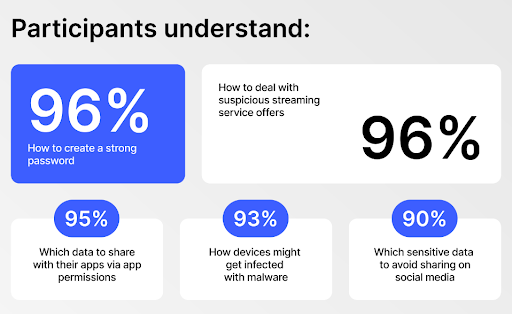Brits are better than Americans at spotting phishing scams, NordVPN study shows
The privacy risks of using AI at work are still a mystery for most

- The UK ranks best among English-speaking countries for awareness of how to identify a phishing website
- By contrast, only 31% of respondents from the US were able to correctly spot such phishing attempts
- While the UK leads the charge in spotting phishing scams, awareness of AI privacy issues is at a mere 5%
In a survey of 30,792 participants from 185 countries, the UK turned out to be the best English-speaking country at identifying phishing websites.
Overall, the UK ranks 5th globally in the annual National Privacy Test. The test takes into consideration things such as knowing how a device can be infected with malware or knowing how to craft a strong password. It was carried out by NordVPN, which is one of the best VPN providers according to our testing.
Although Brits are great at spotting phishing scams, a few key areas still need improvement, such as knowing which online tools to use to protect their digital privacy or knowing where to store their passwords.
Brits are the best at spotting phishing, says NordVPN

According to the latest National Privacy Test carried out by NordVPN, UK citizens have a lot to be happy about in terms of knowing how to stay safe online.
The study revealed that Brits were among the strongest in knowing how to identify a phishing website. The same goes for knowing how their devices might get infected with malware.
The difference in phishing website awareness between the UK and the US is quite striking. For Brits, it was one of the strongest points, but for the US, NordVPN listed it as one of the things that need some improvement. Only 31% of US respondents knew how to properly spot phishing websites, as per the survey findings.
As scams and phishing attempts grow more sophisticated day after day, awareness is the first step toward staying safe. NordVPN's survey shows that Brits are already doing a good job of this, but it never hurts to stay extra safe with tools that make it easier to block phishing attempts.
Tools like the NordVPN Threat Protection Pro take some of the guessing out of spotting online scams. It blocks malicious websites, trackers, and ads, and scans downloads for malware.
Contrary to similar tools offered by other providers, ExpressVPN and IPVanish, Threat Protection Pro works at the URL and JavaScript levels to offer a higher level of protection, even without an active VPN connection.
Other key areas need more work
Across the entire National Privacy Test scores, the UK ranks 5th overall for cybersecurity and online privacy awareness. It's tied with Australia, Switzerland, and Austria, with a score of 58 out of 100.
Meanwhile, the US is tied with Germany at 4th place with a score of 59. Lithuania leads the ranking, scoring 62 out of 100.
Among all respondents, AI at work remains the biggest blind spot. Globally, only 6% of people surveyed answered correctly on privacy issues of using AI for work. Both the US and the UK scored 5% here, slightly behind the global average.
While Brits do a great job of knowing how to craft a strong password (96%), knowing how to store it is another thing entirely. Only 21% of respondents knew how to store their passwords safely. That's another thing that can be made safer with a tool, such as one of the best password managers.
Similarly, NordVPN marked "online tools that protect digital privacy" as one of the areas in need of improvement for the UK, with only 32% of respondents passing that part of the test. Using a secure VPN service will go a long way toward shielding your privacy from cybersecurity threats.
You might also like
- I've spent over 100 hours testing VPNs this year – but 3 things are stopping me switching from NordVPN
- Say goodbye to spam calls – NordVPN launches new spam call protection
- "VPN server count doesn't matter" – NordVPN throws a challenge to the VPN industry
We test and review VPN services in the context of legal recreational uses. For example: 1. Accessing a service from another country (subject to the terms and conditions of that service). 2. Protecting your online security and strengthening your online privacy when abroad. We do not support or condone the illegal or malicious use of VPN services. Consuming pirated content that is paid-for is neither endorsed nor approved by Future Publishing.

Monica is a tech journalist with over a decade of experience. She writes about the latest developments in computing, which means anything from computer chips made out of paper to cutting-edge desktop processors.
GPUs are her main area of interest, and nothing thrills her quite like that time every couple of years when new graphics cards hit the market.
She built her first PC nearly 20 years ago, and dozens of builds later, she’s always planning out her next build (or helping her friends with theirs). During her career, Monica has written for many tech-centric outlets, including Digital Trends, SlashGear, WePC, and Tom’s Hardware.
You must confirm your public display name before commenting
Please logout and then login again, you will then be prompted to enter your display name.